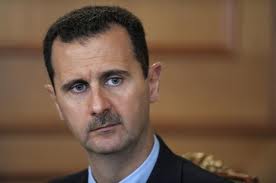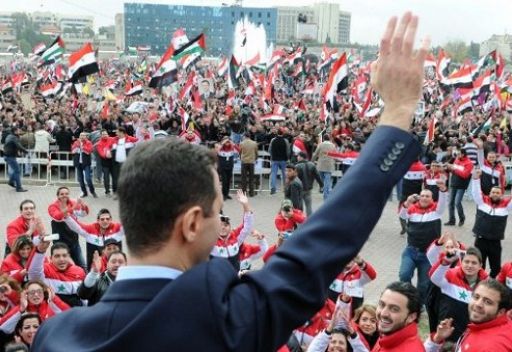Speaking to Turkey’s Cumhuriyet newspaper, Assad said in part 2 of his interview that the drone had entered Syrian airspace in an area that had previously been used by the Zionist entity.
 President Bashar al-Assad has said that the Government of Erdogan has transgressed against the fraternal relations with Syria to direct interference and later to get involved in the bloody events through providing logistical support to terrorists.
President Bashar al-Assad has said that the Government of Erdogan has transgressed against the fraternal relations with Syria to direct interference and later to get involved in the bloody events through providing logistical support to terrorists.
Speaking to Turkey's Cumhuriyet newspaper, Assad said in part 2 of his interview that the drone had entered Syrian airspace in an area that had previously been used by the Zionist entity, state-run news agency reported.
Following is part 2 of the interview:
Journalist: Mr. President, Syrian-Turkish relations were excellent in recent years on the political level as well as the personal and family levels between you and Prime Minister Erdogan. Could you please tell us what happened to these relations so that things reached the current situation?
President al-Assad: First of all, we have to identify who changed. Look at Syria’s relations with other countries and you’ll find that our relations with Iraq, Iran, Jordan and other countries have not changed and remained the same. On the other hand, you can see that Turkey’s relations with most countries of the region, not only with Syria, have changed. As far as we are concerned, what changed on the Turkish side is that in the first stage of the crisis, Turkey transgressed against the brotherly relations with Syria and started to interfere directly in Syrian affairs, which is absolutely unacceptable for us in Syria. We are an independent country which respects itself and respects its sovereignty. That was in the first stage. Later on, the Turkish government started to get involved in the bloody events in Syria by providing logistic support to the terrorists who have been killing innocent people. The Turkish government started adopting policies which are dangerous both to the Turkish people and the Syrian people. That is as far as the political aspects of the relations are concerned. I will not talk here about the personal characteristics of this man who, in his statements, has transgressed against the moral and ethical values that should characterize any politician in the world or even any human being.
Journalist: Mr. President, you said that you do not allow any foreign intervention in internal Syrian affairs. But Erdogan, in almost every speech he made, used to say that he told you, asked you, advised you; and that you promised him, or told him that you would do this and that. What did he say to you? And what did you promise him?
President al-Assad: First, what you are saying about these statements is evidence of what I said: that he was interfering in our internal affairs. Based on the principle that he has nothing to do with internal Syrian affairs, how could I promise him? Isn’t that evidence that he was lying? He used to ask me and provide advice; and I have my vision of things which I have announced in my speeches. He used to advise concerning reforms; and we announced a package of reforms six days after the beginning of the events in Syria in March 2011. We have implemented everything we promised, even changing the constitution completely. If you ask him now, he might talk about reform. But let me raise the question now: if he were genuine in calling for reform, why didn’t he talk about it years ago, since the beginning of our relations with him in 2004? Has he suddenly felt love, affection and concern for the Syrian people? Is it logical that he should feel more concerned for the Syrian people than I do? What would you say about me if I told you that I am more concerned about the Turkish people than you are as a Turkish citizen? You would no doubt say that this is hypocrisy. Let Erdogan concern himself with his internal affairs and not with others’ in order to preserve what remains of the zero-problem policy that can be implemented.
Journalist: If you want to sum up, Mr. President, what did Erdogan want?
President al-Assad: In brief, he had an agenda wider than the Syrian issue. It concerns his personal position and the position of his team. He wanted the terrorists to have a free hand in Syria, that they shouldn’t be arrested or imprisoned, and that we do not defend ourselves. Then, things will be alright for him.
 Journalist: What do you mean by the terrorists? Do you mean the Muslim Brothers?
Journalist: What do you mean by the terrorists? Do you mean the Muslim Brothers?
President al-Assad: Years before the crisis, Erdogan was always concerned for the Syrian Muslim Brothers. He was concerned about them more than he was concerned about Syrian-Turkish relations. There is no doubt now that they are one of his main concerns in the Syrian events, namely defending and helping them. Of course, we do not allow this, neither for Erdogan’s sake nor for the sake of anyone else in the world.
Journalist: It seems that bridges between you and Erdogan have been destroyed.
President al-Assad: I think so, because he lost his credibility. Rebuilding these bridges depends on his ability to restore credibility on the Arab arena in general , not only in Syria, because this is not a personal issue. When he has the courage to stop and acknowledge his numerous mistakes at this stage, I don’t think the people of our region, and the Arab and Syrian people in particular, will have a problem in forgiving him. And I believe that the Turkish people will forgive him too.
Journalist: Mr. President, concerning Syrian-Turkish relations, there has been a number of incidents. An aircraft was downed, Prime Minister Erdogan threatened you, deployed forces on the borders and made all the noise you’re aware of. What is, in your opinion, the way out of the Syrian-Turkish crisis?
President al-Assad: The way out is that the Turkish government corrects the mistakes it made in dealing with the Syrian situation, not manipulating or exploiting any event in order to create big problems, and putting the interests of the Syrian and Turkish people before the narrow personal interests of their officials. So, the way out is there and the process is quite simple and not difficult at all. I am sure that the Turkish people, and the Syrian people, will support this, and at the forefront at these people will be the families of the two Turkish pilots. It is enough for Erdogan to listen to the statement made by the father of one of the pilots to find the way out.
Journalist: You said that Erdogan has changed. Why, in your opinion, has he changed? And what are the things which changed in him?
President al-Assad: The circumstances have changed, and these circumstances showed Erdogan’s reality. I’ll give you some evidence. For example, we heard a lot of shouting in defense of the Palestinians in 2008 when Israel attacked Gaza. But two and a half years before that, we did not hear that kind of shouting when Israel attacked Lebanon. The resistance was there in both cases, and Israel killed in both cases, and in both countries the number of martyrs was approximately 1500.
Journalist: Why, in your opinion?
President al-Assad: Because he showed his sectarian mentality. Because the difference between the two cases is only the sectarian aspect. Today, Erdogan is shedding the tears of hypocrites for the Syrian people. Why hasn’t he cried for those killed in some Gulf countries, although they are innocent, peaceful and unarmed? Why isn’t he speaking about democracy in some Gulf countries?
Journalist: Which country?
President al-Assad: Qatar, for instance. Why didn’t he do anything after the Marmara ship incident except shouting? Why did he challenge Israel, and then suddenly agreed to deploy the missile shield in Turkey? Did he deploy it in order to protect Turkey from the attack of a hostile country? Did America build these bases in order to protect itself against this region? Which country in the region has the capability to threaten America? No country. So, the answer is that he deployed it to protect Israel. These circumstances revealed Erdogan’s reality, no more, no less. Erdogan hasn’t changed. What has changed is the way the people of the region look at him. He has failed on the Arab arena. He no longer exists, neither him nor his credibility.
